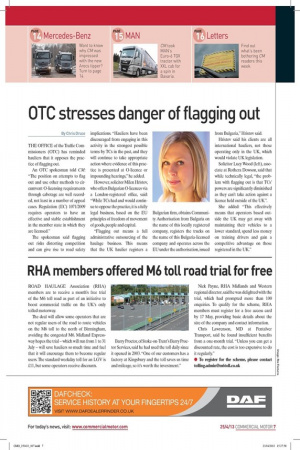OTC stresses danger of flagging out By Chris Druce THE
Page 5

If you've noticed an error in this article please click here to report it so we can fix it.
OFFICE of the Traffic Commissioners (OTC) has reminded hauliers that it opposes the practice of flagging out.
An OTC spokesman told CM: "The position on attempts to flag out and use other methods to circumvent 0-licensing requirements through cabotage are well recorded, not least in a number of appeal cases. Regulation (EC) 1071/2009 requires operators to have an effective and stable establishment in the member state in which they are licensed."
The spokesman said flagging out risks distorting competition and can give rise to road safety implications. "Hauliers have been discouraged from engaging in this activity in the strongest possible terms by TCs in the past, and they will continue to take appropriate action where evidence of this practice is presented at 0-licence or impounding hearings," he added.
However, solicitor Milen Hristov, who offers Bulgarian 0-licences via a London-registered office, said: "While TCs had and would continue to oppose the practice, it is a fully legal business, based on the EU principles of freedom of movement of goods, people and capital.
"Flagging out means a full administrative outsourcing of the haulage business. This means that the UK haulier registers a Bulgarian firm, obtains Community Authorisation from Bulgaria on the name of this locally registered company, registers the trucks on the name of this Bulgaria-licensed company and operates across the EU under the authorisation, issued from Bulgaria," Hristov said.
Hristov said his clients are all international hauliers, not those operating only in the UK, which would violate UK legislation.
Solicitor Lucy Wood (left), associate at Rothera Dowson, said that while technically legal, "the problem with flagging out is that TCs' powers are significantly diminished as they can't take action against a licence held outside of the UK".
She added: "This effectively means that operators based outside the UK may get away with maintaining their vehicles to a lower standard, spend less money on training drivers and gain a competitive advantage on those registered in the UK."







































